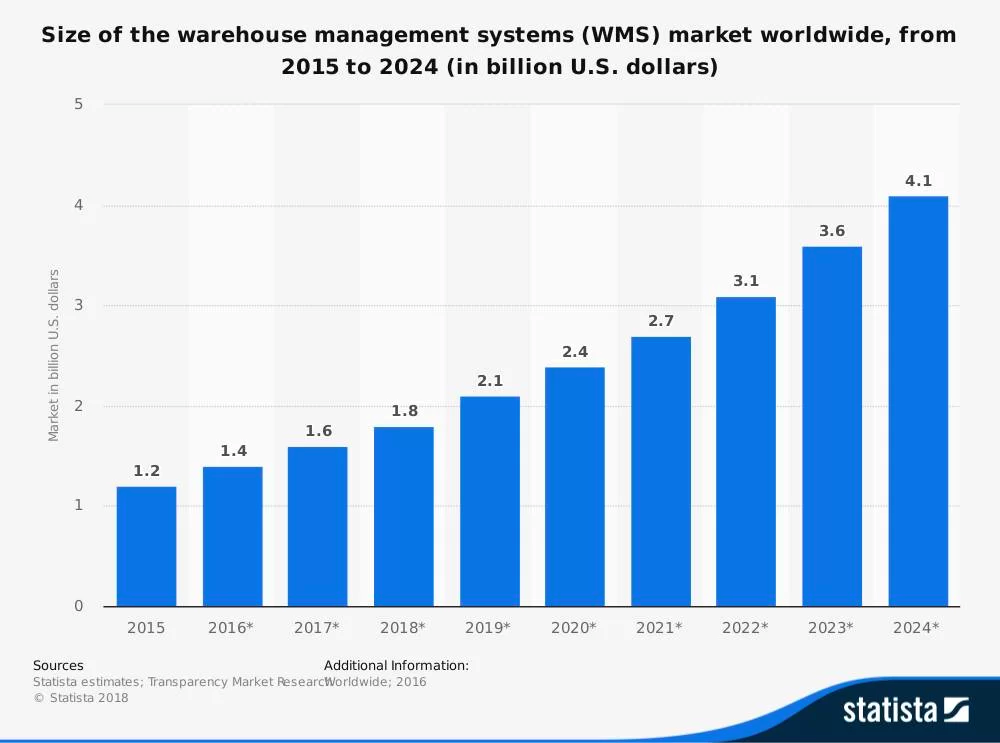MEKSMART
GENERAL NEWS
Author: Meker Meksmart
Update: 19/10/2022
GLOBAL WAREHOUSE MANAGEMENT SYSTEM MARKET SIZE
Warehouse management systems (WMS) have been developed for a while. Research from Transparency Market Research shows the global warehouse management system market size. So how big is the market of WMS? Let's seek the answer in the following content.
Global warehouse management system market size
According to research by Transparency Market Research, the global warehouse management software market size will nearly double from 2020 (US$2.4 billion) to 2024 (US$4.1 billion).

Credit: Statista
Warehouse management has the main contents including the management of:
- Receiving goods to the warehouse
- Shipments
- Transportation
Without the support of modern technology, especially information technology, most of these operating activities have to be done manually, which leads to a lot of limitations such as ease of confusion, making errors, slow speed, and difficulty in seeing the overall system at once.
The above limitations have motivated experts in the field of logistics to invest in the development of a warehouse management system (WMS) to connect and control all stages, ensuring the system operates quickly and accurately. efficient and especially always under control.
There are many built-in WMS solutions, but all must be based on Auto-ID technology, which is a technology that uses barcodes affixed to each product with a combination of components such as scanners, barcodes, management software, and barcode printers.
WMS is not just a separate system but is increasingly being integrated into the overall system of the enterprise, with functions built to combine warehouses and other departments to promote the accuracy of the system and consistency between the different departments.
The Shift of WMS in The Digital Era
Like other industries, the warehouse industry has witnessed an increasing transition toward the cloud-based management system. It is anticipated to drive the demand for warehouse management systems based on the SaaS model.
Cloud-based technologies are believed to boost the WMS introduction, regardless of the complexity and size of the organization.
Skyrocketing demand for a cloud-based management system could be contributable to the small-and-medium-sized businesses which don't require advanced WMS implementation and automation.
Large businesses also switch to utilizing cloud-based WMSs as they allow them to offload a bunch of tasks like infrastructure administration, maintenance, and prompt updates.
Cloud technology enables organizations to run on conventional on-premise tech to transit to other platforms supporting and catering to the client’s demands effectively.
What makes most companies move towards cloud-based management systems includes shorter implementation time and lower upfront costs.
On top of that, the WMS could continuously update the inventory database that moves in and out of the warehouse. In other words, this system could prevent the shortage of inventory.
One more thing, the system also enables the comprehensive transparency of activities in logistics and provides proper tracking of goods.
Wrapping Up
It is noticeable that the global warehouse management system market size is growing more and more. Additionally, there is a shift towards cloud-based management systems in logistics and supply chains.
To survive in the fierce competition among a host of logistics players, businesses are better to implement a suitable WMS to optimize their operations.
Read more: SaaS In Supply Chain Management: Overview & Benefits






